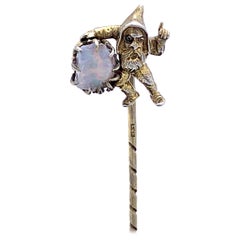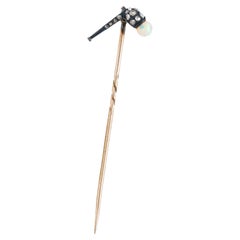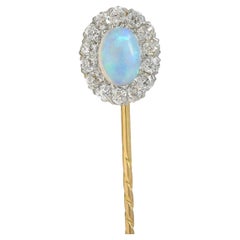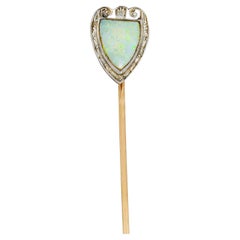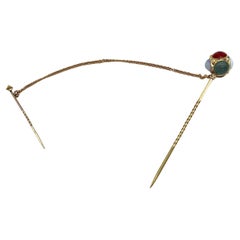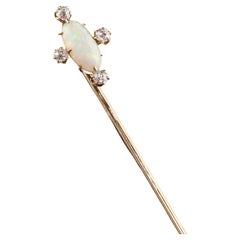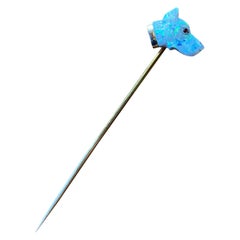Opal Stickpin
Antique 1880s Victorian More Jewelry
Opal, Silver
Antique Mid-19th Century Victorian Brooches
Opal, Gold, Yellow Gold, 14k Gold
Antique 1880s Victorian Brooches
Diamond, White Diamond, Opal, Silver, Gold, 14k Gold, Yellow Gold
Vintage 1910s Edwardian Brooches
Diamond, Opal, Gold, 14k Gold, Yellow Gold, Platinum
Vintage 1910s Edwardian Brooches
Opal, Gold, 14k Gold, Yellow Gold, Platinum
Antique 1880s Victorian Vanity Items
Agate, Jasper, Gold, 14k Gold
Recent Sales
Antique 1890s Unknown Victorian Brooches
Diamond, Opal, Yellow Gold
Early 20th Century British Art Deco Brooches
Opal, Ruby, 10k Gold, Gold, Yellow Gold
Antique Early 1800s Victorian Brooches
Opal, Diamond, Gold, 14k Gold, Yellow Gold
Vintage 1910s Edwardian Brooches
Diamond, White Diamond, Opal, 14k Gold, Yellow Gold, Platinum, Gold
Antique Early 1900s Edwardian Brooches
Opal, 14k Gold, Gold, Yellow Gold
Antique Early 1900s Victorian Brooches
Opal, Black Opal, Gold, 18k Gold, Yellow Gold
Antique Early 1900s Edwardian Brooches
Opal, Gold, 18k Gold, Yellow Gold, Platinum
Antique Early 1900s Art Nouveau Brooches
Opal, Gold, 14k Gold, Yellow Gold
Antique Late 19th Century Late Victorian Brooches
Diamond, White Diamond, Opal, Gold, 14k Gold, Yellow Gold, Enamel
Antique Early 1900s Victorian Brooches
Diamond, White Diamond, Opal, Gold, 14k Gold, Yellow Gold
Vintage 1910s Edwardian Brooches
Opal, Black Opal, Gold, 18k Gold, Yellow Gold, Platinum
Antique 1880s Victorian Brooches
Diamond, Opal, Gold, 18k Gold, Yellow Gold
Antique Late 19th Century Unknown Late Victorian Brooches
Diamond, Opal, Ruby, Sapphire, 18k Gold
Antique Late 19th Century Art Nouveau More Jewelry
Opal, 14k Gold, Yellow Gold
Antique Late 19th Century American Victorian More Jewelry
Opal, 14k Gold
Antique Mid-19th Century Victorian Brooches
Opal, 14k Gold, Rose Gold
Antique Early 1900s Edwardian Brooches
Opal, 14k Gold, Yellow Gold
Antique Early 1900s Victorian Brooches
Opal, Gold, 14k Gold, Yellow Gold
21st Century and Contemporary Brooches
Opal, 14k Gold, Yellow Gold
Antique Early 1900s Edwardian Brooches
Opal, Gold, 14k Gold, Yellow Gold, Platinum
Antique Early 1900s Victorian Brooches
Opal, Black Opal, Gold, Yellow Gold, 18k Gold
People Also Browsed
2010s Australian Artisan Pendant Necklaces
Opal
1990s American Drop Earrings
Diamond, White Diamond, 18k Gold, Platinum
Vintage 1970s Italian Drop Necklaces
Diamond, Emerald, 18k Gold
Antique Early 1900s Art Nouveau Brooches
Diamond, White Diamond, Gold, 18k Gold, Yellow Gold, Enamel
Antique Early 1900s Art Nouveau Brooches
Pearl, Gold, 14k Gold, Yellow Gold, Enamel
Antique 1890s French Art Nouveau Brooches
Diamond, 18k Gold, Enamel
Vintage 1910s Edwardian Brooches
Diamond, White Diamond, Garnet, Gold, Yellow Gold, 14k Gold, 18k Gold, P...
Antique Mid-19th Century Victorian Brooches
Diamond, White Diamond, Ruby, Gold, 14k Gold, Yellow Gold
Antique 1880s Victorian Brooches
Diamond, White Diamond, Garnet, Ruby, Gold, 18k Gold, Yellow Gold, Silver
Antique Early 1900s Art Nouveau Brooches
Diamond, White Diamond, Gold, 14k Gold, Yellow Gold, Enamel
Early 20th Century British Edwardian Brooches
Diamond, Pearl, Natural Pearl, Yellow Gold, Platinum
Antique 1880s Victorian Brooches
Moonstone, Gold, 18k Gold, Yellow Gold
Antique Early 1900s Art Nouveau Brooches
Diamond, White Diamond, Gold, 18k Gold, Yellow Gold, Enamel
Antique Mid-19th Century Victorian Brooches
Diamond, White Diamond, Garnet, 14k Gold, Yellow Gold
Early 20th Century Art Nouveau Brooches
Diamond, Gold, 14k Gold
Antique 1890s Victorian Brooches
Sapphire, Blue Sapphire, Gold, 14k Gold, Yellow Gold
Opal Stickpin For Sale on 1stDibs
How Much is a Opal Stickpin?
Why Gold Shines in Jewelry Craftsmanship
Gold is the feel-good metal, the serotonin of jewelry. Wear vintage and antique gold necklaces, watches, gold bracelets or gold rings and you feel happy, you feel dressed, you feel, well, yourself.
Gold, especially yellow gold, with its rich patina and ancient pedigree going back thousands of years, is the steady standby, the well-mannered metal of choice. Any discussion of this lustrous metal comes down to a basic truth: Gold is elementary, my dear. Gold jewelry that couples the mystique of the metal with superb design and craftsmanship achieves the status of an enduring classic. Many luxury houses have given us some of our most treasured and lasting examples of gold jewelry over the years.
Since its founding, in 1837, Tiffany & Co. has built its reputation on its company jewelry as well as its coterie of boutique designers, which has included Jean Schlumberger, Donald Claflin, Angela Cummings and Elsa Peretti. There are numerous gold Tiffany classics worth citing. Some are accented with gemstones, but all stand out for their design and the workmanship displayed.
For the woman who prefers a minimalist look, the Tiffany & Co. twist bangle (thin, slightly ovoid) is stylishly simple. For Cummings devotees, signature pieces feature hard stone inlay, such as her pairs of gold ear clips inlaid with black jade (a play on the classic Chanel black and tan), or bangles whose design recalls ocean waves, with undulating lines of lapis lazuli and mother-of-pearl. And just about any design by the great Jean Schlumberger is by definition a classic.
Even had he eschewed stones and diamonds, Southern-born David Webb would be hailed for the vast arsenal of heavy gold jewelry he designed. Gold, usually hammered or textured in some manner, defines great David Webb jewelry. The self-taught jeweler made very au courant pieces while drawing inspiration from ancient and out-of-the-way sources — East meets West in the commanding gold necklaces made by Webb in the early 1970s. The same could be said for his endlessly varied gold cuffs.
In Europe, many houses have given us gold jewelry that sets the highest standard for excellence, pieces that were highly sought after when they were made and continue to be so.
Numerous designs from Cartier are homages to gold. There are the classic Trinity rings, necklaces and bracelets — trifectas of yellow, white and rose gold. As a testament to the power of love, consider the endurance of the Cartier Love bracelet.
Aldo Cipullo, Cartier’s top in-house designer from the late 1960s into the early ’70s, made history in 1969 with the Love bracelet. Cipullo frequently said that the Love bracelet was born of a sleepless night contemplating a love affair gone wrong and his realization that “the only remnants he possessed of the romance were memories.” He distilled the urge to keep a loved one close into a slim 18-karat gold bangle.
BVLGARI and its coin jewelry, gemme nummarie, hit the jackpot when the line launched in the 1960s. The line has been perennially popular. BVLGARI coin jewelry features ancient Greek and Roman coins embedded in striking gold mounts, usually hung on thick link necklaces of varying lengths. In the 1970s, BVLGARI introduced the Tubogas line, most often made in yellow gold. The Tubogas watches are classics, and then there is the Serpenti, the house's outstanding snake-themed watches and bracelets.
A collection called Monete that incorporated the gold coins is one of several iconic BVLGARI lines that debuted in the 1970s and ’80s, catering to a new generation of empowered women. Just as designers like Halston and Yves Saint Laurent were popularizing fuss-free ready-to-wear fashion for women on the go, BVLGARI offered jewels to be lived in.
Since Van Cleef & Arpels opened its Place Vendôme doors in 1906, collection after collection of jewelry classics have enchanted the public. As predominantly expressed in a honeycomb of gold, there is the Ludo watch and accessories, circa the 1920s, and the golden Zip necklace, 1951, whose ingenious transformation of the traditional zipper was originally proposed by the Duchess of Windsor. Van Cleef's Alhambra, with its Moroccan motif, was introduced in 1968 and from the start its popularity pivoted on royalty and celebrity status. It remains one of VCA’s most popular and collected styles.
Mention must be made of Buccellati, whose name is synonymous with gold so finely spun that it suggests tapestry. The house’s many gold bracelets, typically embellished with a few or many diamonds, signified taste and distinction and are always in favor on the secondary market. Other important mid-20th-century houses known for their gold-themed jewelry include Hermès and Ilias Lalaounis.
Find a stunning collection of vintage and antique gold jewelry on 1stDibs.
The Legacy of Opal in Jewelry Design
Opals were discovered in 400 BC, and since then five types have been found throughout the world. Before you start shopping for mysteriously beautiful vintage opal rings and other opal jewelry, learn about the different varieties of the gem — and find out which historical figure was reportedly willing to trade his kingdom for a single stone.
Here is a little riddle for you: the month of October has two birthstones, but only one of them encompasses the colors of other birthstones. If you guessed opal, you’re right! (The other gemstone associated with the month of October is tourmaline.)
Opals are such unusual gemstones that there are too many old-wives tales associated with them, like if you’re a blond, wearing an opal necklace will protect your locks from losing color. Opals were also very fashionable in the early 19th century, up until the publication of Sir Walter Scott’s novel Anne of Geierstein in 1829. The title heroine wears an opal and succumbs to an untimely death. However, the British monarchy, and in particular Queen Victoria, did not let this story get in their way, and they frequently gifted opals to friends and family members. October babies should disregard the noise and proudly wear their opals!
There are five types of precious opals: boulder opal, fire opal, crystal/water opal, black opal, and white/light opal. Each variety is distinguished by its color.
So, where does the name come from? The word opal is thought to originate from the Roman opalus or from the Sanskrit úpala (“precious stone”) or from the Greek opallios (“to see a color change”). So while there have been many names for the stones, opals were first discovered in 400 BC in Ethiopia. But the early reference that comes up most often in history books is from the Roman philosopher Pliny the Elder, who wrote about it in 75 AD. In his text he refers to it as opali. The Romans were big fans of opal, Mark Antony was so enamored by it that, as the story goes, he was willing to trade a portion of his kingdom for a single opal.
There's a wide variety of antique and vintage opal jewelry on 1stDibs (and you won't have to trade your kingdom for it).
Read More
This David Webb Coral Flower Brooch Is Better Than a Bouquet
For starters, it is one of the jewelry designer’s most celebrated works.
This Gem-Encrusted Boucheron Brooch Is a Symbol of Mid-Century Glamour and Clever Design
Though it sparkles with more than 27 carats of diamonds, this multifaceted gem delivers more than just dazzle.
The Editor of ‘Town & Country’ Loves Jewelry and History in Equal Measure
Stellene Volandes takes us on a glittering, engrossing tour through the centuries.
5 Fresh Jewelry Trends That Will Bring You Joy This Spring
From cameos to cigar bands, here are the looks on our radar this season.
Tastemaker Bunny Mellon’s Extraordinary Schlumberger Jewels
The philanthropist and heiress was an avid jewelry collector, and her trove of Jean Schlumberger creations embodies the love of nature she shared with the famed designer.
